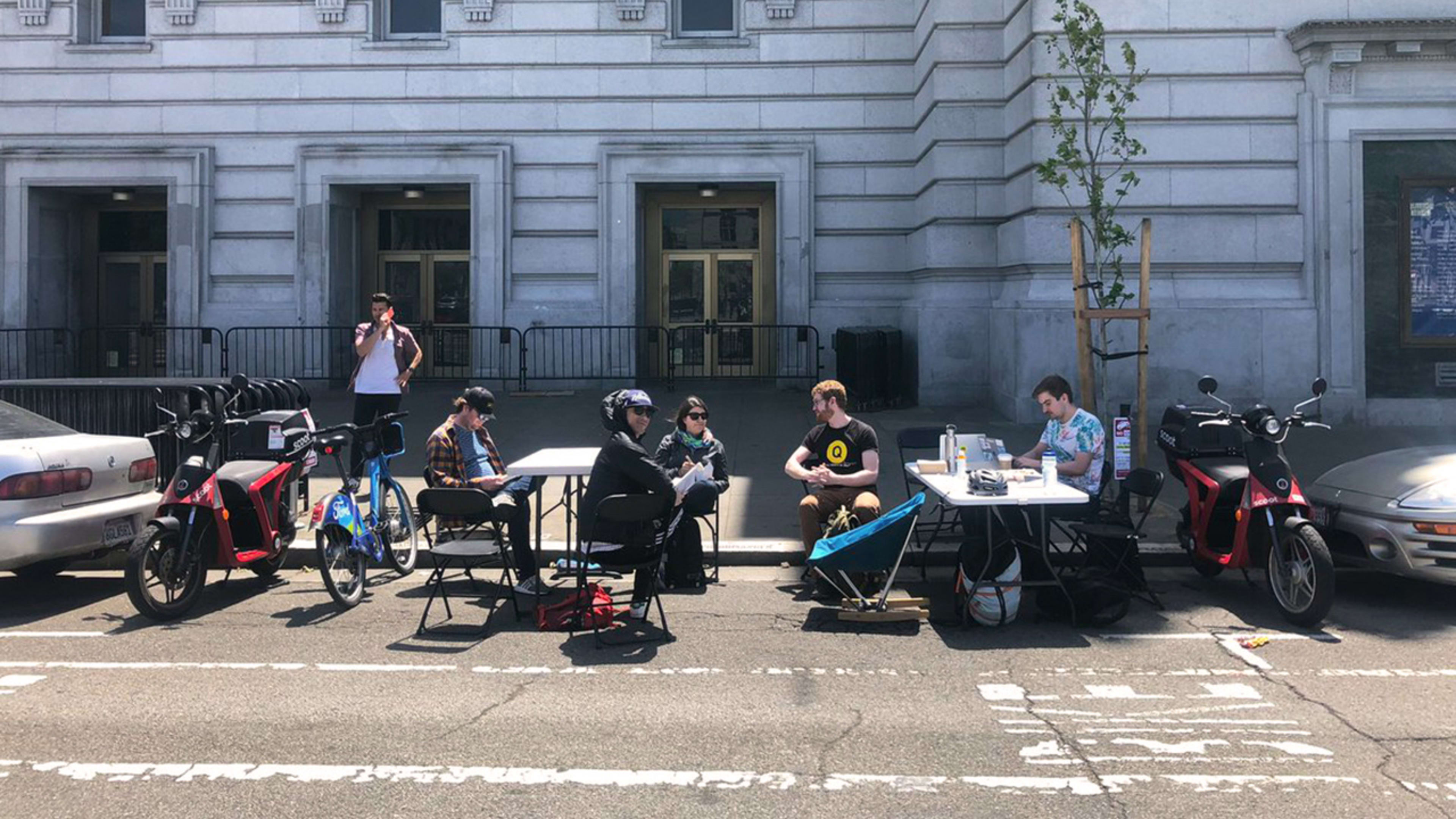On Monday, April 29, San Francisco workers from various industries–tech, investing, design, activism–gathered near Civic Center to work for the day. This is not unusual: Of any city in the U.S., San Francisco has the highest proportion of coworking spaces relative to its population, and it’s pretty common for freelancers and remote employees to find themselves working in close proximity to each other, but not exactly together.
But the gathering on Monday was different. For one thing, it happened outside: Workers congregated around tables set up for the day in an empty parking space. And while all the participants were working on their own projects, together, they were collectively and concertedly proving two points: one about the high cost of coworking spaces in an already unaffordable city, and another about how the space currently dedicated to on-street parking in cramped cities like San Francisco could be put to better and more human-centric use.
https://twitter.com/brezina/status/1122970635678806016
This was the official launch of an initiative called WePark, which raises the question: “What if we used parking for…anything else?” On April 25, the San Francisco-based coder Victor Pontis, sick of working from his apartment but unable to afford a membership to a coworking space like WeWork (which can cost upwards of $400, while rents in the city average around $3,800), dragged a table and chair out to a vacant parking space and worked from there for the day. He’d been joking around about doing just that on Twitter with a couple other people in San Francisco’s urbanist scene (Pontis volunteers for YIMBY Action, a group in the city that advocates for more housing development and better use of urban space). So when he tweeted about actually setting up shop in a parking space, he ended up fielding enough interest, he says, to quickly set up a website for WePark, and plan the event at Civic Center for April 29. A few other people in other cities–one in Toulouse, France, and several in Santa Monica–got wind of the plans in San Francisco through Twitter, and set up WePark stations of their own.
— victor (@VictorPontis) April 25, 2019
WePark is not without precedent. Every September, activists and designers in cities across the world participate in PARK(ing) Day, which encourages residents to transform parking spaces into parklets. Outdoor coworking is also not a new concept: OUTBOX in Silver Spring, Maryland, gets set up every summer as a shaded, Wi-Fi-enabled coworking space in a plot of public land roughly the size of a parking spot. Each OUTBOX can host around 20 workers, but the idea is that because they’re modular, they can proliferate fairly quickly and easily. And it’s made it to popular culture: In a Broad City episode, one of the main characters, Ilana, sets up SheWork, a sidewalk coworking space for women and smokers, and an Improv Everywhere stunt had participants transforming public phone booths into coworking hubs.
For Matt Brezina, an entrepreneur and investor who also volunteers with People Protected, an advocacy effort to call for more protected bike lanes, WePark was certainly a bit tongue-in-cheek, but the urgency of what it was actually drawing attention to took precedent. “We had people come through who didn’t have an office because they work for themselves or from home, who couldn’t afford coworking, but like the idea of having a work community,” says Brezina, who was one of the people originally chatting with Pontis about WePark. He says around 30 people came through, and only had to collectively pay $2.25 an hour–the cost of on-street parking in San Francisco.
.@weparkweparty in action. SF's newest and most lit co-working space, only $2.25 an hour. @irapolis @VictorPontis #wepark pic.twitter.com/uGtNtows7O
— Joe Girton (@yogirton) April 29, 2019
A few other participants were also in the activist community with Brezina, and were especially cognizant of the statement WePark was making about the sheer volume of space ceded to cars in cities. “The climate deadline is in the next 10 years, but we continue to allow unfettered access to our city streets and spaces by Chevy Suburbans,” Brezina says. San Francisco has around 275,000 parking spaces, and as concerns about cars’ climate impacts mount, and more sustainable personal transit options like bikes and scooters grow in popularity, it’s worth questioning, Brezina says, if on-street parking is truly the best use of city street space.
Even though WePark sprung up almost overnight, there’s no question it will continue in San Francisco and likely, other cities: Pontis says he’s a had interest from people in places like New York and Raleigh, and he’s building out methods for organizers to communicate and share ideas for making the pop-up events work; Pontis created a Slack channel for interested people to join and start talking. Some early learnings from the first day: Set up in range of a strong public Wi-Fi signal, near restrooms and water fountains, and with some means for people to charge their laptops and devices. Organizers could easily see WeParks growing in collaboration with local businesses like coffee shops, which could provide bathrooms, caffeine, and Wi-Fi in exchange for steady business. Brezina also imagines that the pop-up coworking spaces could get more sophisticated, like the well-equipped OUTBOX scheme in Silver Spring–by leaning on Wi-Fi-enabled shipping containers powered by solar, and working with the city on permitting them. Until that happens, the guerrilla approach is yet another reminder that space set aside for cars does not have to remain that way, and transforming it could lead to more inclusive and sustainable cities.
This piece has been updated to include Broad City and Improv Everywhere.
Recognize your brand’s excellence by applying to this year’s Brands That Matter Awards before the early-rate deadline, May 3.
